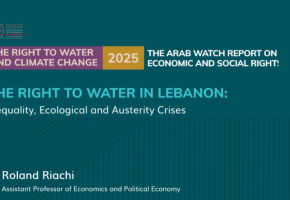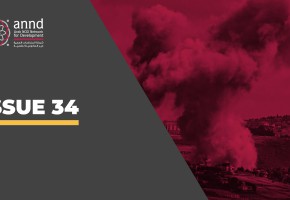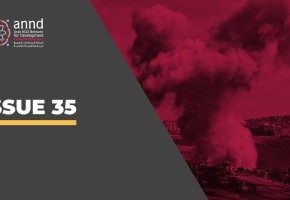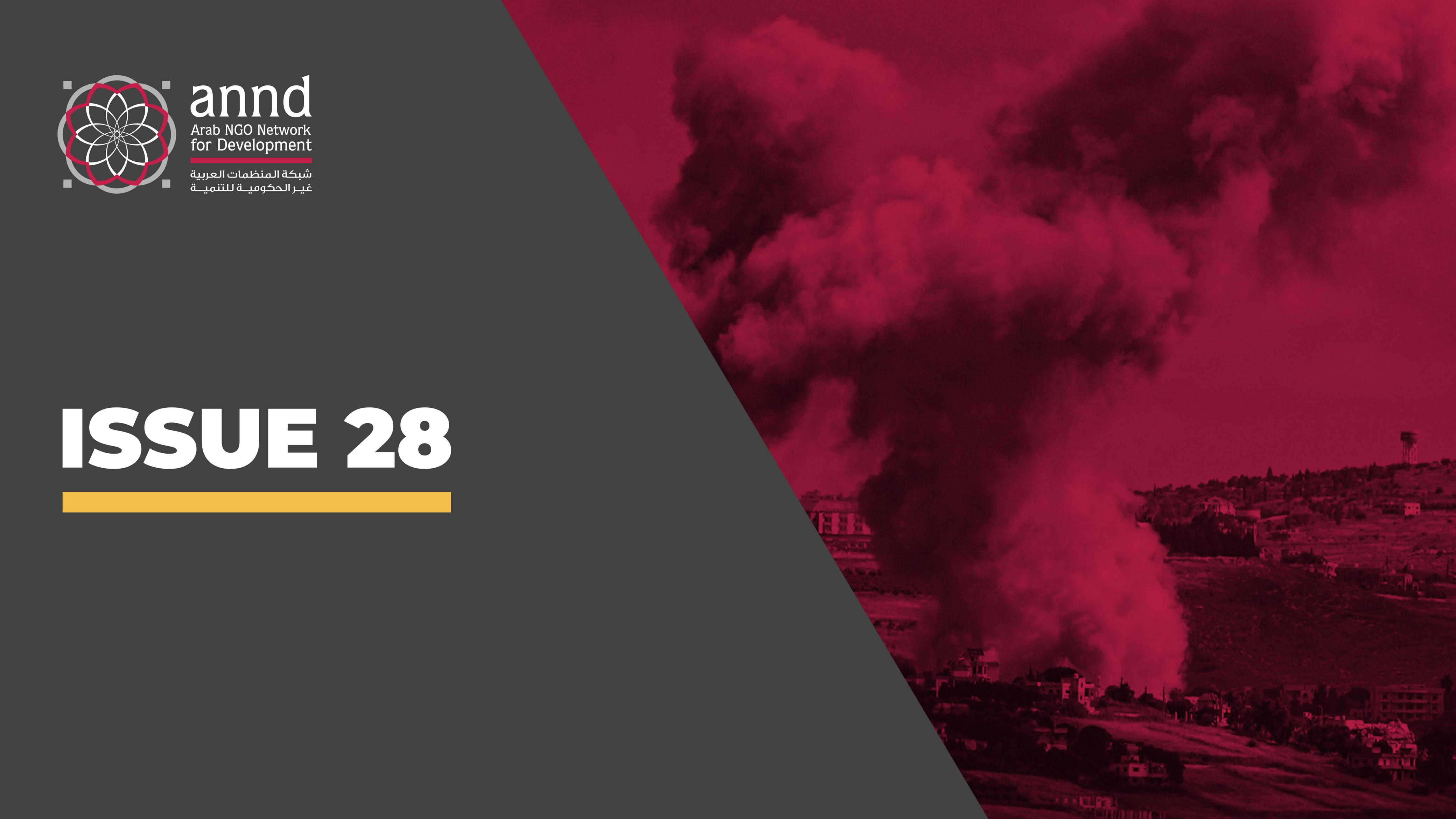
A Region on Fire
Issue 28 - October 24, 2024
International Efforts: Paris Conference supporting Lebanon and BRICS Summit for Strengthening Multilateralism
U.S. Secretary of State’s Tour in the Region to Prevent the Situation from Worsening
Internationally, parallel movements with no clear expectations:
International efforts have resumed in various directions, including the wars in Gaza and Lebanon, and a potential strike on Iran. The BRICS Summit called for a ceasefire and urged the avoidance of a wider regional war. An international conference to support Lebanon, hosted by Paris, focused on humanitarian aid and also addressed the political aspect related to the implementation of Resolution 1701. Regarding Gaza and Palestine, the U.S. Secretary of State’s visit to Israel and Qatar hinted at the possibility of reviving negotiations, including a potential prisoner-hostage exchange with Hamas. These efforts are still in the early stages, with no clear expectations in stopping the war.
Lebanon: The escalation continues, with new areas being bombed. Diplomatic efforts to support Lebanon are ongoing through the Paris Conference, while internal debates grow over how to interpret Israel's messages and conditions. The focus is on the steps needed to secure a ceasefire and restore government authority by reforming institutions. There are still disagreements about the interpretation of Resolution 1701 and its requirements. At the same time, Israel's increased strikes on Syria are raising international concerns.
Syria: the Syrian Observatory for Human Rights documented 114 attacks in 2024: 94 airstrikes and 20 missile attacks by ground forces. Israel targeted multiple sites, destroying around 196 targets, including buildings, weapon depots, and vehicles. These strikes killed 257 fighters and injured 181 others.
Gaza: On the 384th day of the Israeli aggression on Gaza, civil defense reported more than 150 civilian casualties, including both dead and injured, in the bombing of Jabalia camp. This brings the total number of casualties in the ongoing military operation in Jabalia and northern Gaza to around 1,000 over the past 20 days.
In two key developments since the war began on October 7, Hamas leadership stated that releasing hostages is possible if Israel agrees to a ceasefire and withdraws from Gaza. At the same time, the Israeli army chief suggested that a ceasefire with Lebanon is possible after eliminating Hezbollah’s leadership.
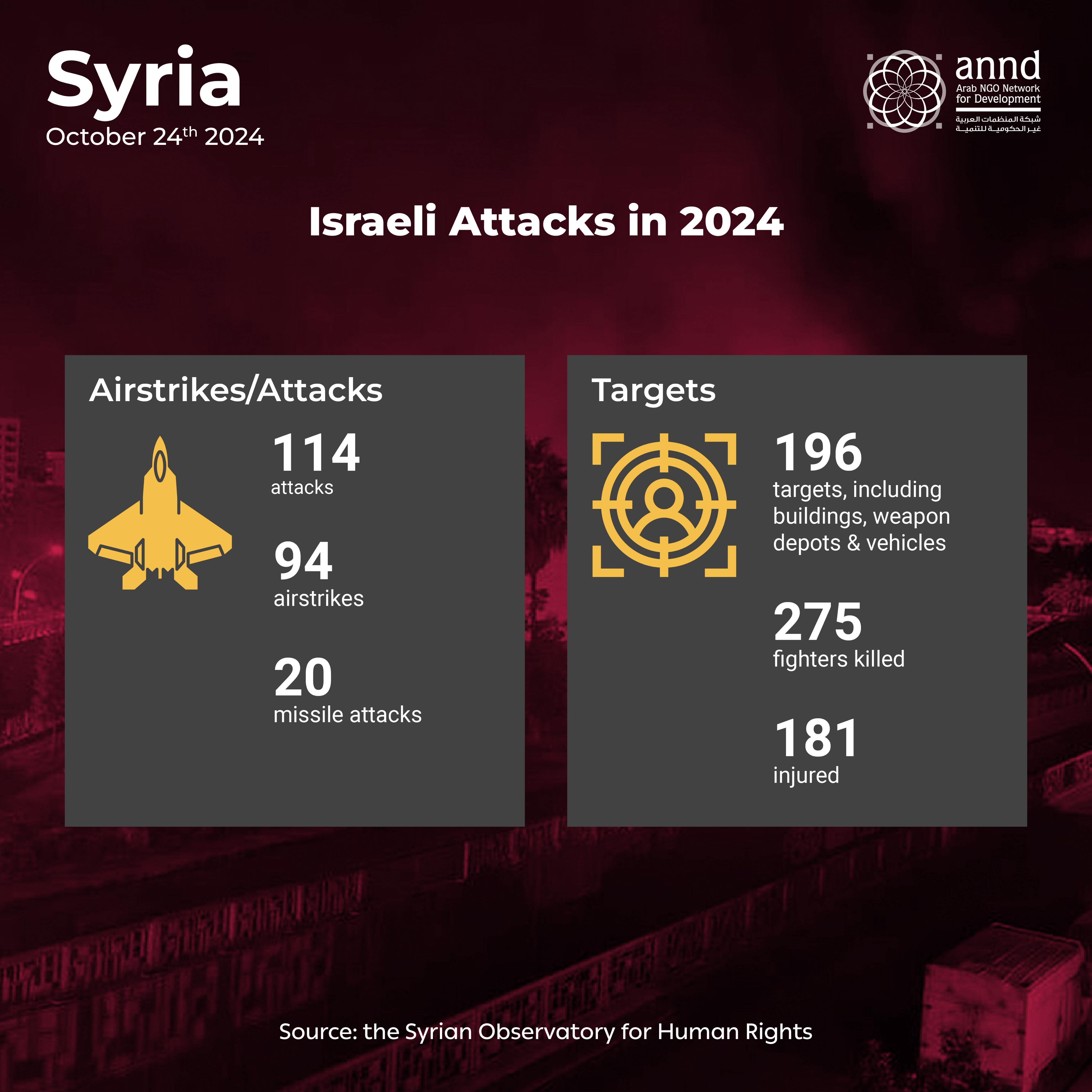
UN Warns About the Regional Conflict's Impact on Syria and the Need to Restart Political Process
The UN Special Envoy for Syria, Geir Pedersen, warned that the spread of the regional conflict into Syria is concerning and may worsen, leading to serious consequences for Syria and international peace and security. He noted that Syria is still deeply divided, with Syrians politically and geographically split in different areas, facing immense and varying pressures. He emphasized that there is no quick solution to these challenges unless the political process led by Syrians and facilitated by the UN is resumed, as it has been stalled for a long time.
Pedersen stated that last month saw the fastest and broadest Israeli airstrikes in 13 years, hitting dozens of sites across Syria, including residential areas, even in the heart of Damascus. He mentioned that hundreds of thousands of Syrians and Lebanese are fleeing from Lebanon to Syria, a country that is also experiencing rising conflict. The UN Refugee Agency reported that about 425,000 people crossed into Syria in recent weeks to escape Israeli airstrikes and violence. Approximately 72% of them are Syrians, while the rest are mostly Lebanese. Pedersen reiterated the need to protect Syrians wherever they are, including those displaced from their homes and those who remain where they are.
Palestine: Genocide, Settlement, and Arrests
For the 20th day, the Israeli army continues its campaign of violence and forced displacement in northern Gaza, as the war enters its 384th day. The situation is marked by a humanitarian crisis and unprecedented horrors, with ground operations focused on the Jabalia camp, which experiences daily massacres. The army has committed atrocities against civilians near Kamal Adwan Hospital and is imposing a tight blockade on areas sheltering displaced people.
On Thursday morning, the civil defense in Gaza announced a complete halt to its operations in the northern governorate after the Israeli army arrested five of its members and directly targeted three others. They also bombed the only firefighting vehicle in northern Gaza.
Local sources reported artillery shelling and gunfire from Israeli army vehicles northeast of the Al-Bureij camp in central Gaza. Al-Awda Hospital in Gaza stated that 16 people, including children, were killed in an Israeli strike on a school in the Al-Nusairat camp. The hospital added that 32 people were injured due to the attack on the Shahid School near in the Al-Nusairat camp.
Gaza has witnessed heavy Israeli bombing and gunfire since Thursday morning, along with scattered explosions. Huge explosions from demolishing residential buildings shook western Rafah, coinciding with Israeli airstrikes and artillery targeting the Al-Mawasi area.
Israel has arrested dozens of residents from Jabalia and increased its artillery and airstrikes on various areas in Gaza, forcing hundreds of families to leave their shelters in northern Gaza. The Israeli army claimed to have arrested 200 individuals they labeled as “troublemakers” in Jabalia since the start of military operations there.
In another development, CNN reported that a truck from the UN Relief and Works Agency (UNRWA) was directly hit by an Israeli missile, killing one of its staff members. Mahmoud Basal, a civil defense spokesperson in Gaza, stated that the army had arrested five of their members and taken them to an unknown location. He added that Israeli tanks targeted the only firefighting vehicle in northern Gaza, setting it on fire. Civil defense operations have completely stopped in the northern governorate, creating a disastrous situation.
The Israeli settlement group “Nahala” reported that 700 families have registered to move to six new settlements in Gaza, expressing hope to start building within a year despite the ongoing conflict.
On Thursday, Israeli forces invaded camps in Nablus in the northern West Bank and arrested several Palestinians during their incursion into the Al-Fawwar camp in southwest Hebron. Military vehicles also entered the Balata and Askar camps in eastern Nablus.
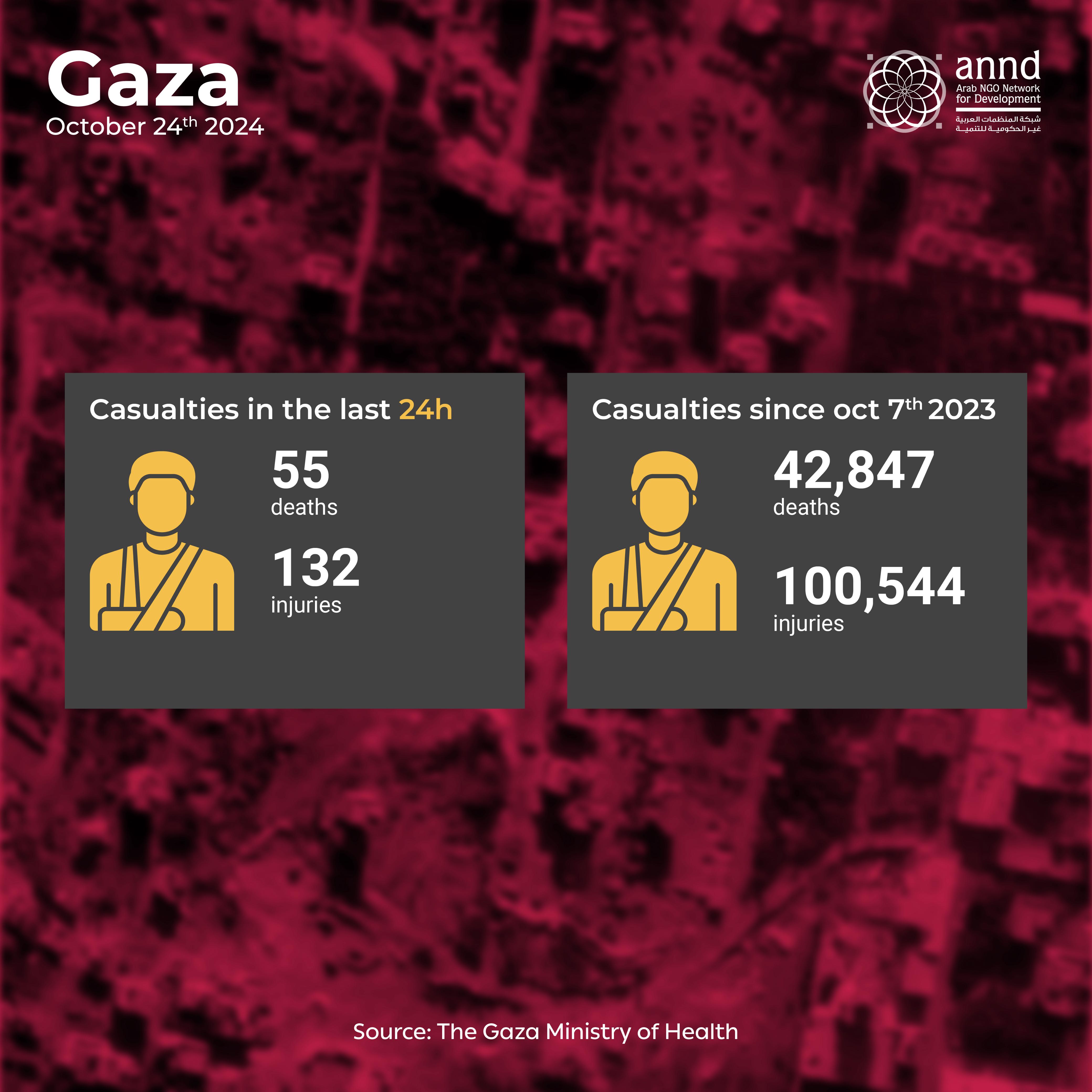
Battlefield Developments in Lebanon
In the past 24 hours, there have been 111 airstrikes and shellings in various areas of Lebanon, mostly in the south and Bekaa Valley. This brings the total number of attacks since the beginning of the conflict to 10,960.
The Lebanese National News Agency reported at least 17 Israeli airstrikes, making it one of the most violent nights since the war began between Hezbollah and Israel on September 23. The agency stated that six buildings were destroyed near the Lilaki area in southern suburb of Beirut.
In its morning report on Thursday, the Israeli army stated that its air force attacked over 160 Hezbollah targets in Lebanon in the past 24 hours. They claimed to have eliminated dozens of Hezbollah fighters. The Israeli army also continued its airstrikes in southern Lebanon and Bekaa Valley, including a devastating strike on a residential building in the town of Khidr in Baalbek, resulting in 7 deaths and 14 injuries. They targeted the Alamat area in Jbeil and struck a car on the Kahaleh road north of Beirut, killing two people inside.
The Israeli army spokesperson warned residents in southern Lebanon against moving south or returning to their homes or olive fields, stating these areas are dangerous combat zones. He reiterated his warning to ambulances and medical teams to avoid cooperating with Hezbollah, threatening action against any vehicle transporting fighters, regardless of its type.
The Lebanese army announced on Thursday morning that three of its members, including an officer, were killed by the Israeli army in the outskirts of Yater-Bint Jbeil during an evacuation operation. This marked the second deadly attack on their forces in four days.
Meanwhile, Hezbollah continued its shelling of northern and central Israel. The Israeli army radio reported that, for the first time since the war began, Hezbollah launched 50 rockets at the Galilee within two minutes. Hezbollah stated that it is engaged in intense fighting in the town of Aita al-Chaab, using various types of machine guns and rockets. The Israeli army acknowledged the deaths of 57 soldiers and officers on the Lebanese front since the fighting began.
The Lebanese Ministry of Health reported that in the past 24 hours, there were 24 deaths and 118 injuries, bringing the total number of casualties since the beginning of the conflict to 12,119 deaths and 2,593 injured.
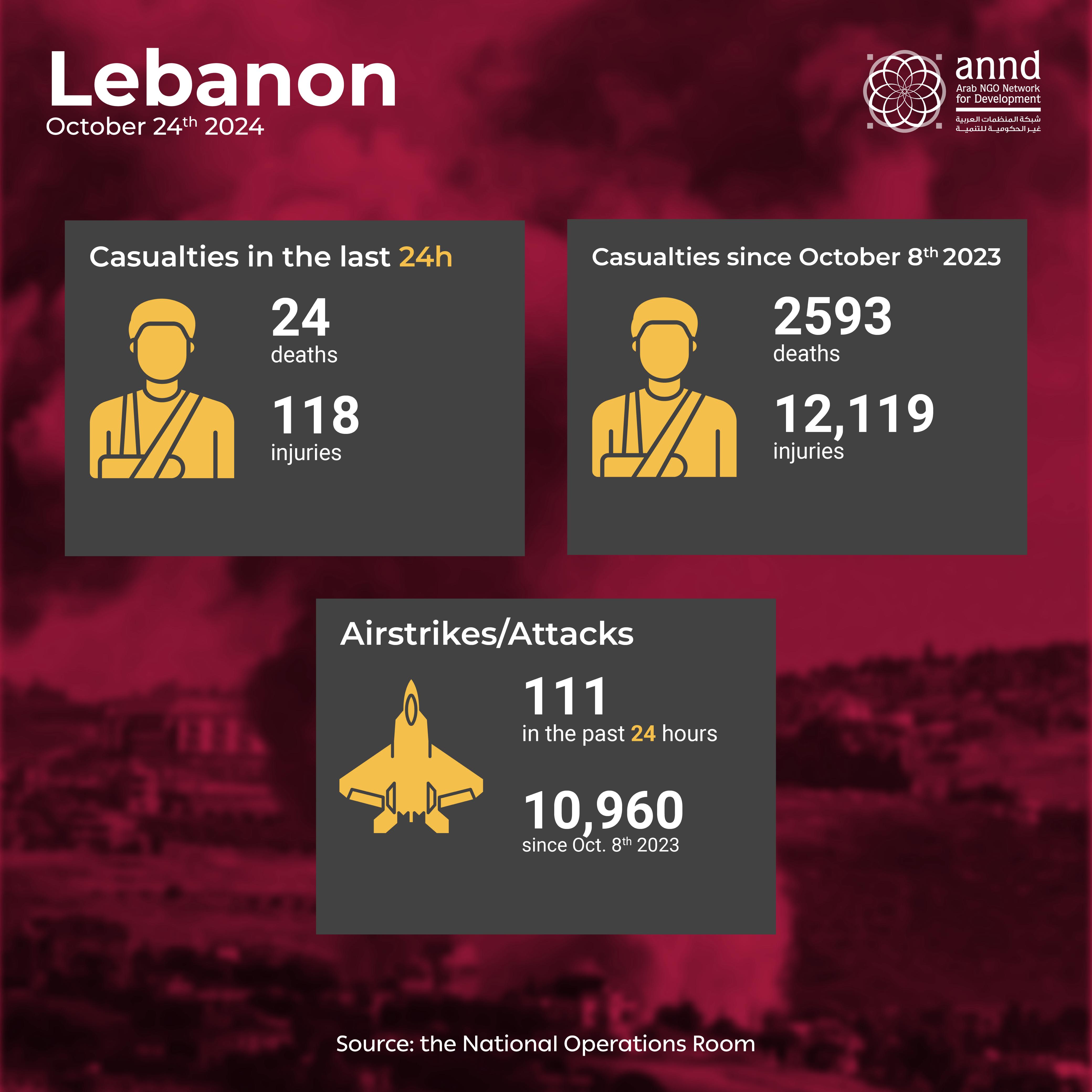
On Thursday, an international conference to support Lebanon was held in Paris. The goal was to provide urgent humanitarian aid to Lebanon, support its military, and push for a ceasefire.
According to a framework document sent to the delegations, the conference was initiated by French President Emmanuel Macron. It aims to confirm the need to stop hostilities based on UN Security Council Resolution 1701 from 2006. This resolution calls for southern Lebanon to be free of any forces or weapons other than those belonging to the Lebanese state.
The conference also aims to rally the international community to help the displaced, which the Lebanese government estimates costs $250 million per month. Additionally, the conference seeks to intensify support for the Lebanese armed forces.
The conference raised more than $800 million in humanitarian aid and $200 million to help the military, according to French Foreign Minister Jean-Noël Barrot.
Lebanese caretaker Prime Minister Najib Mikati attended the conference, along with key ministers involved in relief efforts. Around 70 government delegations and 15 international organizations also participated. Iran and Israel were not invited, and Israeli Prime Minister Benjamin Netanyahu criticized the conference.
French President Emmanuel Macron said the conference aims to support Lebanon in facing challenges from "Israeli" attacks and displacement. He called for prioritizing national interests over divisions and for ending foreign wars on Lebanese soil. Macron stated that France is ready to coordinate aid to Lebanon and will provide €100 million in assistance. France will also contribute to the redeployment and armament of the Lebanese army and support Lebanese authorities.
He stressed the urgent need for a ceasefire and expressed regret that Iran has involved Hezbollah in the war. Macron stated it is in Lebanon's interest to remain neutral. He called for the implementation of Resolution 1701 regarding Lebanon and establishing a foundation for lasting peace along the Blue Line. He emphasized there is no justification for targeting UNIFIL forces in southern Lebanon and that the UN mission in Lebanon must adapt to the new circumstances.
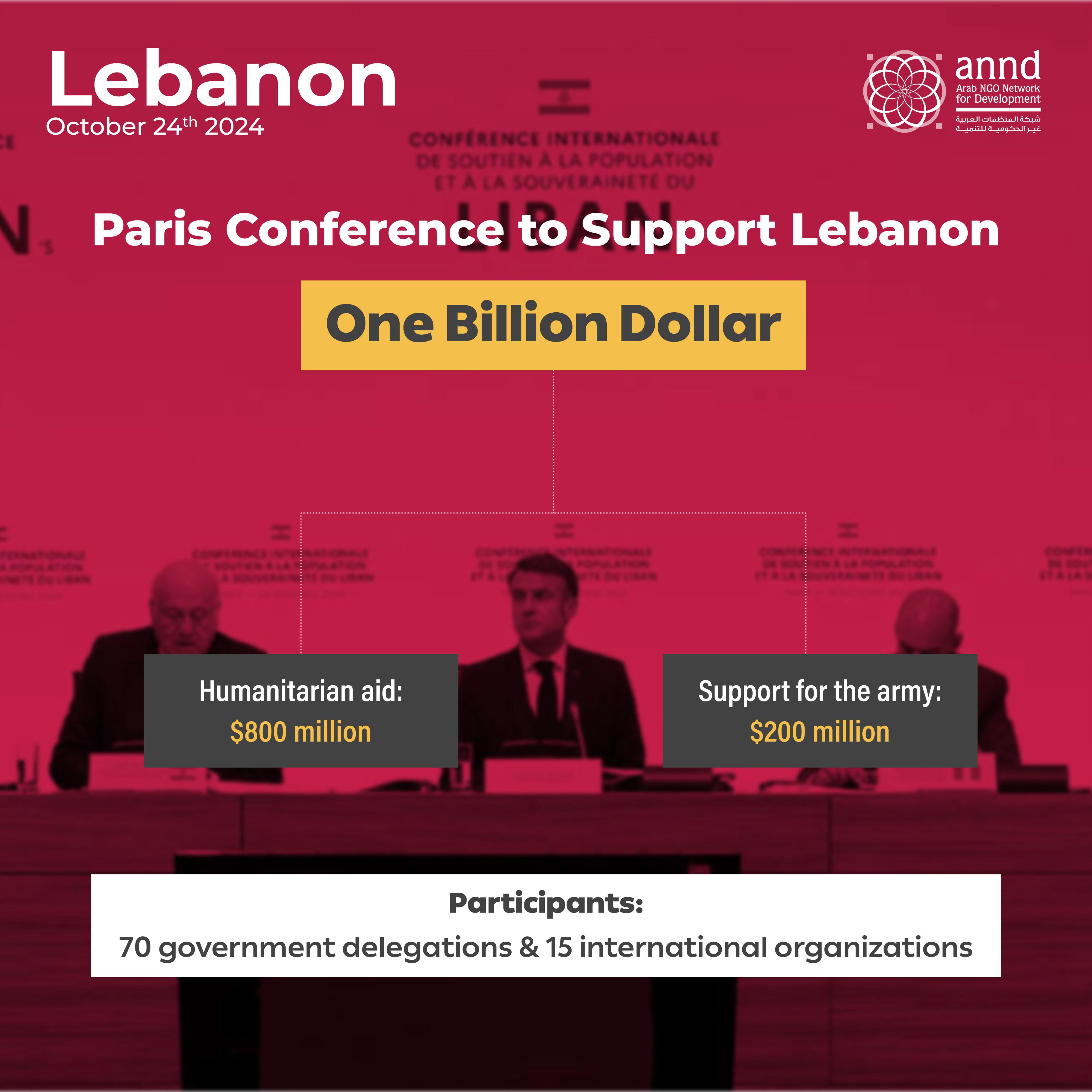
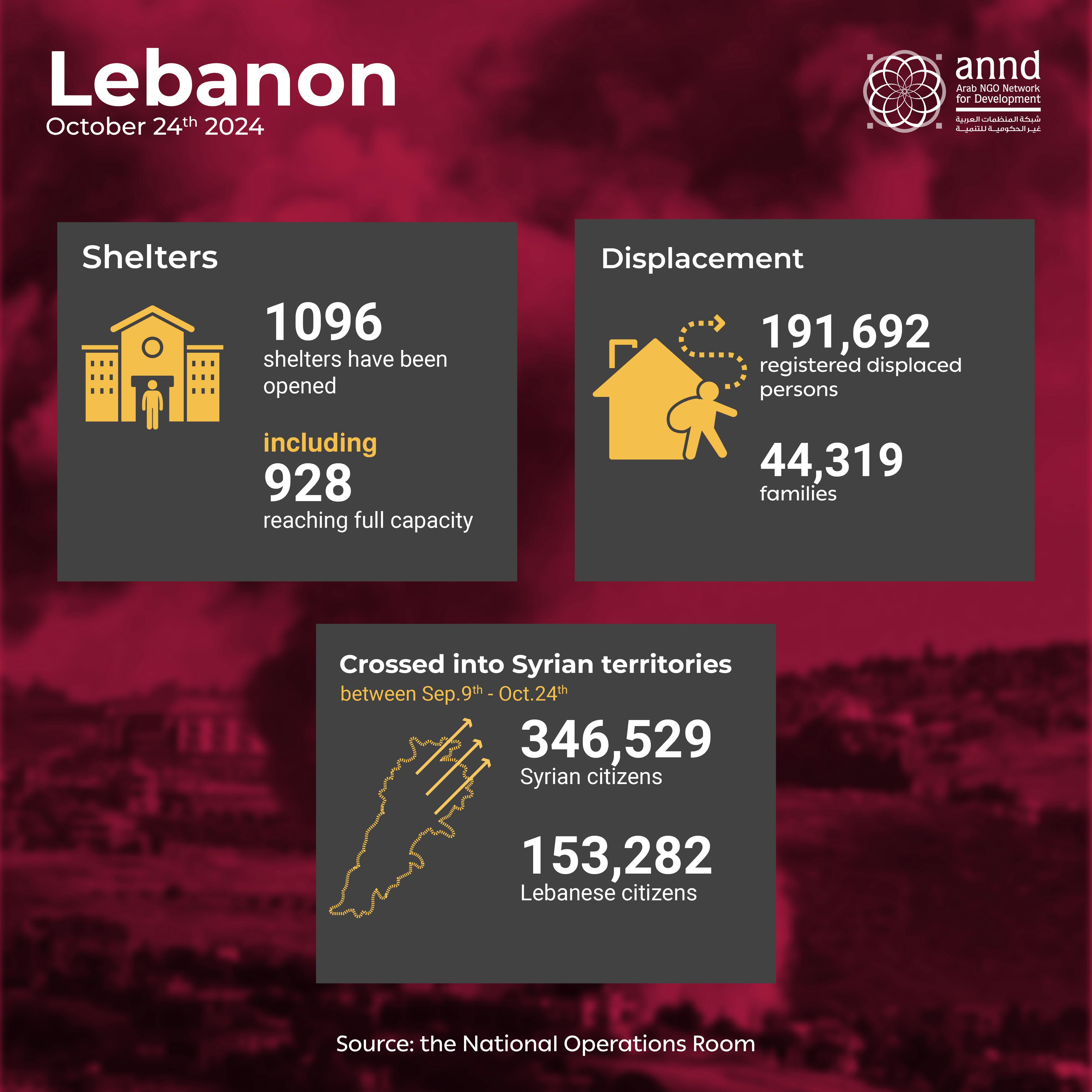
- The Russian president warned at a BRICS Plus meeting that the Middle East is on the "verge of a full-scale war" amid rising tensions in the region. The summit concluded yesterday with the "Kazan Statement," which addressed international conditions, emphasizing the need to maintain a multipolar system and tackle challenges related to sustainable development, climate, economic cooperation, and energy security. The summit adopted additional points concerning the Middle East. It expressed deep concern over the deteriorating situation in the occupied Palestinian territories, particularly the recent escalation of violence in Gaza and the West Bank due to Israeli military actions. The statement called for an immediate and comprehensive ceasefire in Gaza, unconditional release of all hostages and detainees, and unhindered access for humanitarian aid. It condemned attacks on humanitarian workers and urged adherence to international law and relevant UN Security Council resolutions, welcoming regional and international efforts to calm the situation, especially by Egypt and Qatar. The statement expressed concern over the situation in southern Lebanon, condemning the significant loss of civilian lives and damage to infrastructure from Israeli attacks on residential areas. It called for an immediate halt to military actions and for the preservation of Lebanon's sovereignty and territorial integrity, emphasizing the need to comply with UN Security Council resolutions 1701 (2006) and 2749 (2024).
- UN Secretary-General António Guterres stated that Israel "continues its intense bombardment of populated areas in Lebanon." He emphasized the need to respect state sovereignty and protect civilians and urged Lebanon's leaders to ensure the effectiveness of institutions, especially the military. He confirmed that targeting UNIFIL forces in Lebanon could constitute a war crime.
- The EU mission in Lebanon distributed a statement from the EU's High Representative, Josep Borrell stating that the military confrontation between Hezbollah and Israel is the cause of an unacceptable number of civilian casualties and unbearable level of destruction across the country, making the situation of Lebanon – a country already affected by a multitude of crises – even more fragile.
- UNIFIL commented on reports of Israeli forces targeting UN soldiers in southern Lebanon several times, including the use of white phosphorus, which injured 15 soldiers. UNIFIL's deputy spokesperson, Candice Ardil, said that since the start of Israeli incursions into Lebanon on October 1, UNIFIL has recorded nearly 20 incidents resulting in damage to UN property or facilities.
- Palestinian President Mahmoud Abbas stated that Israel plans to "empty" Gaza of its population, particularly in the northern regions. He emphasized the need to "stop the aggression" that has lasted for over a year and to resort to a political solution based on international law and the resolutions of international legitimacy for a two-state solution.
- Turkish President Recep Tayyip Erdoğan announced during his meeting with Russian President Vladimir Putin in Kazan on Wednesday that Israel's actions in Gaza and Lebanon threaten global security.
- The Qatari Prime Minister announced that Doha has reestablished contact with Hamas after the killing of its political bureau chief, Yahya Sinwar, in an Israeli military operation. The Emir of Qatar discussed joint diplomatic mediation efforts with the U.S. Secretary of State to achieve a ceasefire in Gaza.
- U.S. National Security Advisor Jake Sullivan expressed deep concern over Iran's nuclear program and the determination to prevent it from obtaining a nuclear weapon. He noted that Iran undermines the vision of peace and stability in the Middle East sought by well-meaning nations for a long time.
Recent publications

Neoliberalism and Feminist Discourse: Between Assimilation and Resistance in the Arab Context
